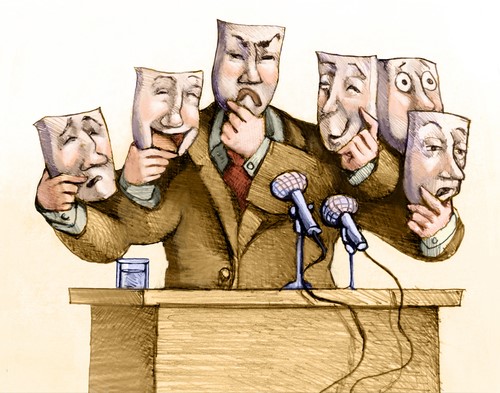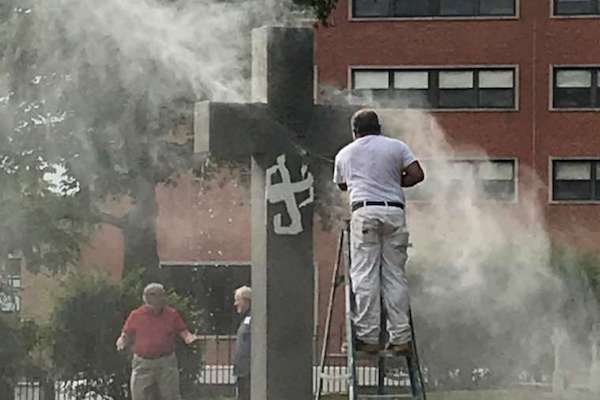Sandro Magister is no flaming progressive. He is an Italian Vaticanista and worth reading. He is a traditionalist but not off the rails as some on either side of the orthodoxy spectrum seem to be.
Magister seems to think that Archbishop Vigano is losing it:

Benedict XVI promoted him to apostolic nuncio in the United States in 2011. The meek theologian pope certainly could not have imagined, nine years ago, that Archbishop Carlo Maria Viganò - who returned to private life in 2016 but has been anything but hidden - would today be blaming him for having “deceived” the whole Church in that he would have it be believed that the Second Vatican Council was immune to heresies and moreover should be interpreted in perfect continuity with true perennial doctrine.
Because this is just the length to which Viganò has gone in recent days, capping off a relentless barrage of denunciations of Church heresies over the last few decades, with the root of it all being the Council, most recently in an exchange with Phil Lawler, editor of CatholicCulture.org.
Attention: not the Council interpreted badly, but the Council as such and en bloc. In his latest public statements, in fact, Viganò has rejected as too timid and vacuous even the claim of some to “correct” Vatican II here and there, in its texts which in his judgment are more blatantly heretical, such as the declaration “Dignitatis Humanae” on religious freedom. Because what must be done once and for all - he has demanded - is "to drop it 'in toto' and forget it.”
Naturally with the concomitant “expulsion from the sacred precinct” of all those Church authorities who, identified as guilty of the deception and “invited to amend,” have not changed their ways.
According to Viganò, what has distorted the Church ever since the Council is a sort of “universal religion whose first theoretician was Freemasonry.” And whose political arm is that “completely out-of-control world government” pursued by the “nameless and faceless” powers that are now bending to their own interests even the coronavirus pandemic.
Last May 8, cardinals Gerhard Müller and Joseph Zen Zekiun also carelessly affixed their signatures to an appeal by Viganò against this looming “New World Order.”
Just as to a subsequent open letter from Viganò to Donald Trump - whom he invoked as a warrior of light against the power of darkness that acts both in the “deep state” and in the “deep Church” - the president of the United States replied enthusiastically, with a tweet that went viral.
But getting back to the reckless indictment launched by Viganò against Benedict XVI for his “failed attempts to correct conciliar excesses by invoking the hermeneutic of continuity,” it is obligatory to give the accused the right to speak.
The hermeneutic of continuity - or more precisely: “the ‘hermeneutic of reform,’ of renewal in the continuity of the one subject-Church” - is in fact the keystone of the interpretation that Benedict XVI gave of Vatican Council II, in his memorable address to the Vatican curia on Christmas Eve of 2005, the first year of his pontificate
.
It is a speech that is absolutely to be reread in its entirety:
> “Your Eminences, venerable brothers…”
But here in summation is how pope Joseph Ratzinger developed his exegesis of Vatican Council II.
READ THE REST THERE BY PRESSING HERE.
Magister seems to think that Archbishop Vigano is losing it:
Archbishop Viganò On the Brink of Schism. The Unheeded Lesson of Benedict XVI

Benedict XVI promoted him to apostolic nuncio in the United States in 2011. The meek theologian pope certainly could not have imagined, nine years ago, that Archbishop Carlo Maria Viganò - who returned to private life in 2016 but has been anything but hidden - would today be blaming him for having “deceived” the whole Church in that he would have it be believed that the Second Vatican Council was immune to heresies and moreover should be interpreted in perfect continuity with true perennial doctrine.
Because this is just the length to which Viganò has gone in recent days, capping off a relentless barrage of denunciations of Church heresies over the last few decades, with the root of it all being the Council, most recently in an exchange with Phil Lawler, editor of CatholicCulture.org.
Attention: not the Council interpreted badly, but the Council as such and en bloc. In his latest public statements, in fact, Viganò has rejected as too timid and vacuous even the claim of some to “correct” Vatican II here and there, in its texts which in his judgment are more blatantly heretical, such as the declaration “Dignitatis Humanae” on religious freedom. Because what must be done once and for all - he has demanded - is "to drop it 'in toto' and forget it.”
Naturally with the concomitant “expulsion from the sacred precinct” of all those Church authorities who, identified as guilty of the deception and “invited to amend,” have not changed their ways.
According to Viganò, what has distorted the Church ever since the Council is a sort of “universal religion whose first theoretician was Freemasonry.” And whose political arm is that “completely out-of-control world government” pursued by the “nameless and faceless” powers that are now bending to their own interests even the coronavirus pandemic.
Last May 8, cardinals Gerhard Müller and Joseph Zen Zekiun also carelessly affixed their signatures to an appeal by Viganò against this looming “New World Order.”
Just as to a subsequent open letter from Viganò to Donald Trump - whom he invoked as a warrior of light against the power of darkness that acts both in the “deep state” and in the “deep Church” - the president of the United States replied enthusiastically, with a tweet that went viral.
But getting back to the reckless indictment launched by Viganò against Benedict XVI for his “failed attempts to correct conciliar excesses by invoking the hermeneutic of continuity,” it is obligatory to give the accused the right to speak.
The hermeneutic of continuity - or more precisely: “the ‘hermeneutic of reform,’ of renewal in the continuity of the one subject-Church” - is in fact the keystone of the interpretation that Benedict XVI gave of Vatican Council II, in his memorable address to the Vatican curia on Christmas Eve of 2005, the first year of his pontificate
.
It is a speech that is absolutely to be reread in its entirety:
> “Your Eminences, venerable brothers…”
But here in summation is how pope Joseph Ratzinger developed his exegesis of Vatican Council II.
READ THE REST THERE BY PRESSING HERE.






























